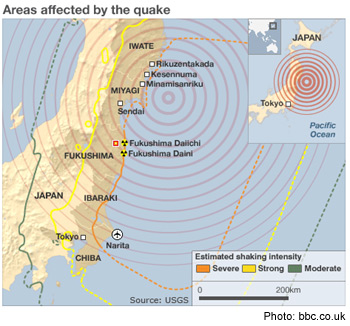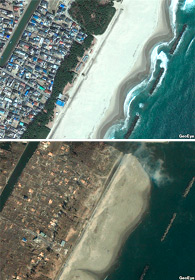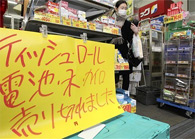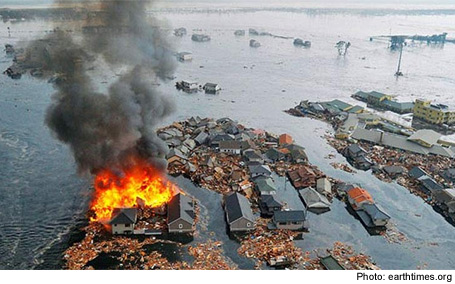LGBT people especially those living at evacuation centres may have to keep their relationships under wraps and not be able to draw on the support of his/her same-sex partner despite the trauma they are going through. Transgender people may not be able to access medical supplies they need and may also face discrimination at evacuation centres such as using the restrooms of the gender they identify with, LGBT groups tell Fridae.

On March 11, Japan was hit by a magnitude-9 earthquake – the largest ever in the country’s history. The quake and a massive 10-metre high tsunami that followed devastated dozens of cities and villages along a 2,100km stretch of the nation's north-eastern coast. Many survivors in the affected areas have spent a week without running water, as power and fuel shortages loomed and temperatures dropped below freezing. The quake was felt as far away as Tokyo, approximately 360km south of the epicentre, with residents now facing occasional power cuts, and fuel shortage and no or very short supply of bottled water, rice, dry noodles, and other essentials although there was relatively little damage reported.
According to media reports, the National Police Agency (NPA) said on Friday that the massive quake and tsunami has left 6,911 people dead and 10,316 others unaccounted for in Japan as of Friday. Japan's public broadcaster NHK said that more than 410,000 people in 12 prefectures are living in shelters, including the worst-hit Miyagi, Fukushima and Iwate. The Japanese government has evacuated residents from areas within a 20km radius from the plant and advised those within a 30km radius to stay indoors although the US government is recommending that those within an 80km radius evacuate the area.
Azusa Yamashita, who lives in Iwate Prefecture and works as a project researcher at the Office for Gender Equality, Iwate University, says she has been able to go to the office to work every day since the quake as her town is not sea-facing. She reports that she believes staff and volunteers of GayJapanNews to be safe.
Azusa, the co-founder and editor of Tokyo-based GayJapanNews, also told Fridae that there isn’t an active LGBT scene or LGBT organisations in the most affected provinces of Iwate, Miyagi and Fukushima as the Tohoku region is largely conservative.
The largest city nearest to the epicentre is Sendai which has a population of about one million. There are two known LGBT groups, Anego and Yarokko, operating in the city.
Azusa adds that according to the information posted on Anego’s website as of 17 March, the LGBT centre is open but they are not able to get in touch with some of their members in the coastal areas in Miyagi.


Fridae's community partners report that Yarokko, a community-based organisation that delivers HIV outreach for the gay community throughout the Tohoku area, has indicated that all their members are accounted for and no damage was sustained. However unstable communications has hampered independent verification of Yarokko's condition and other LGBT NGOs in the area.
Fridae and its community partners are still waiting to hear from Rainbow Ring in Tokyo or Queer Film Festival team in Tokyo.
Situation for PLHIV in Sendai and other areas in Japan
When contacted by Fridae, Tokyo-based Japanese Network of People Living With HIV/AIDS (JANP+); PLACE Tokyo, a HIV/AIDS support organisation; and Japan Foundation for AIDS Prevention (JFAP) say all their team members are safe.
In relation the situation for people living with HIV in areas most affected by the earthquake and tsunami, sources close to Fridae indicate that HIV treatment facilities are still operational in Sendai, the largest city nearest to the epicentre. Japanese health officials released emergency guidelines on March 15 to help doctors and PLHIV deal with the situation and potential interrupts to treatment. However the lack of telephone and internet services across the Tohoku area make it difficult for local organisations to verify the status of HIV facilities and other health services outside of the city.
In other areas of Japan, and in the capital Tokyo, it is understood that HIV treatment and other health services are coping with the situation.
Fridae will continue communicating with the Japanese Network of People Living with HIV (JaNP+) as they work to assess the full impact on this community and address any specific needs that arise during the reconstruction process.
Specific challenges for the LGBT community and PLHIV
During crisis times such as this, LGBT people may face additional difficulties. Azusa, who’s the co-founder and editor of GayJapanNews, says LGBT people especially those living at evacuation centres may have to keep their relationships under wraps and not be able to draw on the support of his/her same-sex partner despite the trauma they are going through. Additionally, a LGBT Japanese national who is in a relationship with a foreign partner who is evacuated may have no recourse to be reunited if their relationship is not recognised by immigration authorities overseas.
Transgender people may not be able to access medical supplies they need and may also face discrimination at evacuation centres such as using the restrooms of the gender they identify with.
For a person living with HIV/AIDS (PLHIV) whose possessions and houses is damaged by the quake and/or tsunami is likely to face difficulties in accessing medication as medical supplies may have been damaged and not replenished due to limited transportation due to the fuel shortage and other logistical factors.
Fridae is concerned about how the earthquake and tsunami has affected people, organisations and businesses; and want to hear from local LGBT groups and people as well as people living with HIV. We are also working with our community partners in Japan to organise support for the relief and longer-term reconstruction effort. If you have suggestions about how to help or have news about LGBT organisations in Japan requiring assistance, please send us an email to japanresponse2011@fridae.com.

